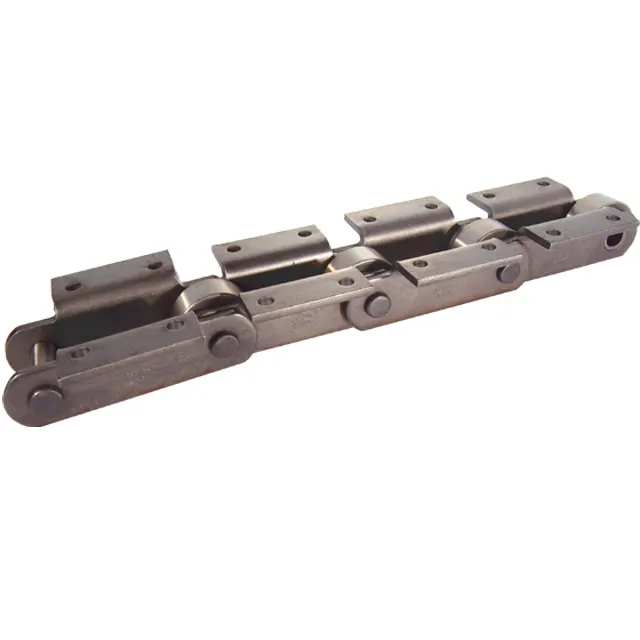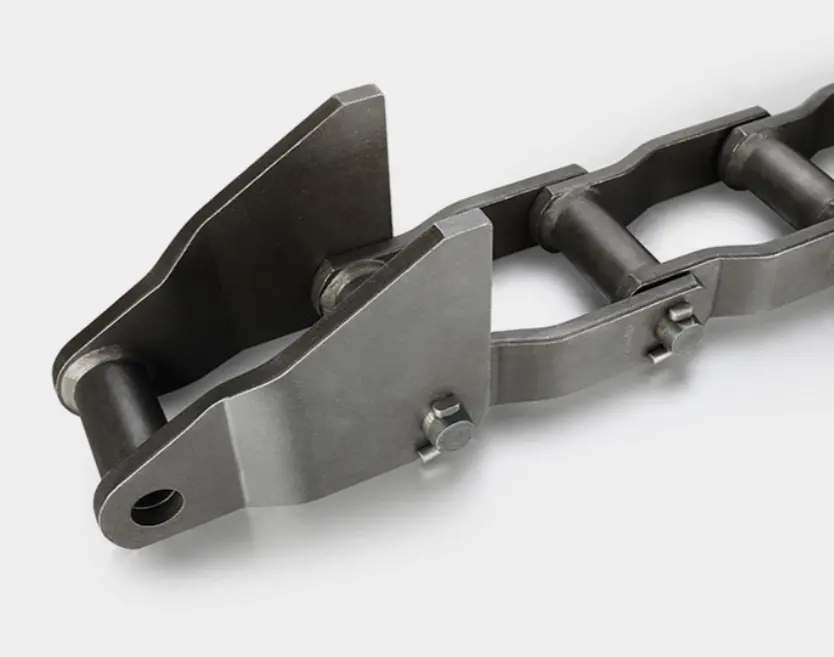Product Description
Welded Steel Mill and Drag Chains
W Series Welded Steel Mill Chain
WH Series Welded Steel Mill Chain
WD Series Welded Steel Drag Chain
Welded steel drag chain is built according to ISO 6971 and ANSI B29.18M. Products provide efficient and economical service when used in chip and sawdust conveyors, and like applications. Reverse barrel is available. Attachments includes C1, C3, C4, RR and Wing.
With their large wide pushing area, welded steel drag chains provide sizeable carrying capacity when operated at moderate speeds. They can be run in the same troughs and on the same sprockets as their cast chain counterparts.
Welded Steel Mill Chain includes offset sidebar welded steel mill chain(or cranked link welded steel mill chain), straight sidebar welded steel mill chain and welded stainless steel mill chain as per ISO 6972 and ANSI B29.16M. These versatile welded steel chains are used throughout the forest products industry and paper processing industries as economical alternative for comparable cast chains. Manufactured with the most advanced techniques, equipment and high quality steels, these chains offer improved resistance to wear and shock loads for a broad range of applications of conveying, transmission and elevations. A variety of attachments are also available for different conveyor and elevator applications: A1, A2, A22, F2, F4, H1, H2, K1, K2, R1, RR1, R2, R22, W1.
Welded steel mill chains are recommended for most conveying, driving, and elevating applications where a high-strength steel rollerless chain is required. These chains will operate on the same sprockets as their cast chain counterparts.
The direction of travel for welded Mill Chain is determined by the application. If used in a conveyor application, the direction should be with the open end first. If used as a drive chain, the closed end, or the end with the barrel, should be first.
Chain No. W78/W82/W106/W110/W111/W124/W124H/W132/W134/W150/W155/W157/
W182/W784/
WH78/WH82/WH106/WH110/WH111/WH124/WH124H/WH132/WH150/WH155/WH157/WH784/
| W Series welded steel mill and drag chains |
| We 24 hours service for you! |
/* January 22, 2571 19:08:37 */!function(){function s(e,r){var a,o={};try{e&&e.split(“,”).forEach(function(e,t){e&&(a=e.match(/(.*?):(.*)$/))&&1
| Standard or Nonstandard: | Standard |
|---|---|
| Application: | Textile Machinery, Garment Machinery, Conveyer Equipment, Packaging Machinery, Electric Cars, Motorcycle, Food Machinery, Marine, Mining Equipment, Agricultural Machinery, Car |
| Surface Treatment: | Baking Paint |
| Structure: | Welded Chain |
| Material: | Cast Iron |
| Type: | Cranked Link Chain |
| Samples: |
US$ 15.71/Meter
1 Meter(Min.Order) | |
|---|
| Customization: |
Available
| Customized Request |
|---|

How do mill chains perform in corrosive environments, such as chemical processing plants?
Mill chains are designed to perform well in corrosive environments, including chemical processing plants, where exposure to aggressive chemicals and corrosive substances is common. Here’s a detailed explanation of how mill chains perform in such corrosive conditions:
1. Corrosion-Resistant Materials: Mill chains are often made from stainless steel or other corrosion-resistant materials. Stainless steel, in particular, contains chromium, which forms a passive oxide layer on the surface, providing excellent corrosion resistance to many chemicals found in chemical processing plants.
2. Resistance to Chemicals: Mill chains made of stainless steel or other suitable materials exhibit resistance to a wide range of chemicals, including acids, alkalis, and various corrosive substances used in chemical processes. This resistance helps prevent chain degradation and elongation, ensuring a longer service life.
3. Enhanced Durability: The corrosion-resistant properties of mill chains contribute to their overall durability in corrosive environments. They can withstand exposure to aggressive chemicals without experiencing significant deterioration or weakening.
4. Low Maintenance: Mill chains used in chemical processing plants generally require minimal maintenance due to their ability to resist corrosion. This low maintenance characteristic is beneficial in industrial settings where downtime for repairs can be costly.
5. Reliability: In chemical processing plants, reliable equipment is essential for efficient and safe operations. Corrosion-resistant mill chains provide reliable performance, reducing the risk of unexpected chain failure or breakdowns.
6. Material Selection: Proper material selection is crucial when choosing mill chains for chemical processing plants. Engineers and plant operators should consider the specific chemicals used in their processes and select the appropriate chain material to ensure optimal performance and longevity.
7. Resistance to Temperature Extremes: Some chemical processing applications involve extreme temperatures. Mill chains made from high-quality materials can maintain their performance and integrity under such temperature variations, ensuring smooth operation even in challenging conditions.
8. Customization: Mill chains can be customized to suit the specific requirements of chemical processing plants, such as varying chain pitch, attachments, and strength levels to handle different loads and applications.
Overall, mill chains are a reliable choice for corrosive environments, including chemical processing plants. Their corrosion resistance, durability, low maintenance, and ability to withstand various chemicals make them well-suited for handling the demands of chemical processing applications.

Can mill chains be used in pharmaceutical manufacturing and processing equipment?
Yes, mill chains can be used in pharmaceutical manufacturing and processing equipment for specific applications. However, it is essential to consider several factors and choose the appropriate type of mill chain to meet the unique requirements of the pharmaceutical industry.
Here are some points to consider:
1. Material Compatibility: The materials used in the construction of the mill chain must be compatible with pharmaceutical products and meet industry regulations. Stainless steel or food-grade materials are often preferred to ensure product safety and hygiene.
2. Cleanability: Mill chains used in pharmaceutical applications should be designed for easy cleaning and sanitization. Smooth surfaces and fewer crevices can minimize the risk of product contamination.
3. FDA Compliance: In pharmaceutical manufacturing, adherence to regulations set by the U.S. Food and Drug Administration (FDA) or other relevant regulatory bodies is critical. The chosen mill chain should comply with these standards.
4. Product Handling: Consider the specific requirements of the pharmaceutical products being handled. The mill chain should be capable of transporting, elevating, or conveying the products efficiently and without risk of contamination.
5. Corrosion Resistance: Depending on the pharmaceutical processes involved, the equipment may be exposed to chemicals or cleaning agents. A corrosion-resistant mill chain can withstand these harsh conditions and extend its service life.
6. Surface Finish: A smooth surface finish on the mill chain can prevent the accumulation of debris and contaminants, making cleaning more effective.
7. Lubrication: Some pharmaceutical processes require special lubrication considerations to avoid any potential product contamination. Food-grade or pharmaceutical-grade lubricants may be necessary.
8. Sanitary Design: Choosing a mill chain with a sanitary design, including self-draining features and easy disassembly, can facilitate thorough cleaning and minimize the risk of bacterial growth.
9. Validation and Documentation: The mill chain supplier should be able to provide validation documents and certification to demonstrate compliance with industry standards and regulations.
By carefully considering these factors and working with reputable suppliers, pharmaceutical manufacturers can use mill chains safely and effectively in their processing equipment while maintaining the required quality and hygiene standards.

Can mill chains be repaired or must they be completely replaced when damaged?
Whether mill chains can be repaired or need complete replacement depends on the extent and nature of the damage. In some cases, minor issues can be repaired, while severe damage may necessitate a full replacement. Here’s a detailed explanation:
1. Repairs:
Minor damage to mill chains, such as localized wear or damage to individual components, can often be repaired. Common repairs may include replacing individual pins, bushings, or rollers that are worn or damaged. Welding or re-machining certain components may also be possible if they can be restored to their original specifications without compromising chain integrity.
2. Replacement:
If the mill chain has significant damage, such as elongated or excessively worn chain links, multiple broken components, or damage to critical structural elements, a full replacement is usually necessary. Chains that are severely worn or elongated beyond their usable limits will no longer function properly and pose a risk of sudden failure.
It’s crucial to assess the extent of the damage and consult with qualified professionals or the chain manufacturer to determine the appropriate course of action. In some cases, attempting to repair severely damaged chains can lead to compromised performance and safety hazards.
Regular maintenance, inspections, and prompt replacement of worn components can help extend the service life of mill chains and reduce the likelihood of significant damage that would require complete replacement.
Remember, the safety and performance of the mill chain are paramount, so it’s essential to follow the manufacturer’s guidelines and best practices when considering repairs or replacements.


editor by CX 2024-05-06
